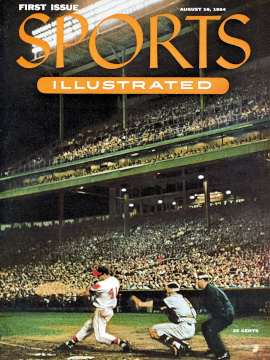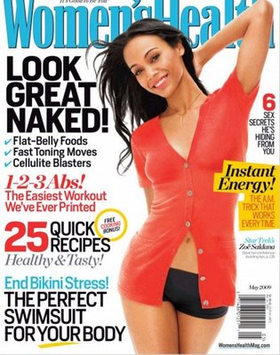
Sports Illustrated (SI) is an American sports magazine first published in August 1954. Founded by Stuart Scheftel, it was the first magazine with circulation over one million to win the National Magazine Award for General Excellence twice. It is also known for its annual swimsuit issue, which has been published since 1964, and has spawned other complementary media works and products.

Men's Health (MH), published by Hearst, is the world's largest men's magazine brand, with 35 editions in 59 countries. It is also the best-selling men's magazine on U.S. newsstands.

Out is an American LGBTQ news, fashion, entertainment, and lifestyle magazine, with the highest circulation of any LGBTQ monthly publication in the United States. It presents itself in an editorial manner similar to Details, Esquire, and GQ. Out was owned by Robert Hardman of Boston, its original investor, until 2000, when he sold it to LPI Media, which was later acquired by PlanetOut Inc. In 2008, PlanetOut Inc. sold LPI Media to Regent Entertainment Media, Inc., a division of Here Media, which also owns Here TV. In 2017, Here Media sold its magazine operations to a group led by Oreva Capital, who renamed the parent company Pride Media. On June 9, 2022, Pride Media was acquired by Equal Entertainment LLC known as equalpride putting the famous magazine back under queer ownership.

Ladies' Home Journal was an American magazine last published by the Meredith Corporation. It was first published on February 16, 1883, and eventually became one of the leading women's magazines of the 20th century in the United States. In 1891, it was published in Philadelphia by the Curtis Publishing Company. In 1903, it was the first American magazine to reach one million subscribers.

The Australian Women's Weekly, sometimes known as simply The Weekly, is an Australian monthly women's magazine published by Mercury Capital in Sydney and founded in 1933. For many years it was the number one magazine in Australia before being outsold by the Australian edition of Better Homes and Gardens in 2014. As of February 2019, The Weekly has overtaken Better Homes and Gardens again, coming out on top as Australia's most read magazine. The magazine invested in the 2020 film I Am Woman about Helen Reddy, singer, feminist icon and activist. Editor-in-chief Nicole Byers told Film Ink "Helen’s story of adversity and triumph is nothing short of inspirational. The Weekly has been telling stories of iconic Australian women for more than 80 years and we're delighted to be supporting the film production".

The Sports Illustrated Swimsuit Issue is published annually by American magazine Sports Illustrated and features female fashion models, celebrities and athletes wearing swimwear in various locales around the world. The highly coveted cover photograph has been considered as the arbiter of supermodel succession. The issue carries advertising that, in 2005, amounted to US$35 million in value. First published in 1964, it is credited with making the bikini, invented in 1946, a legitimate piece of apparel.

CNN/Sports Illustrated (CNN/SI) was a 24-hour sports news network. It was created by Time Warner, merging together its CNN and Sports Illustrated brands and related resources. It was launched on December 12, 1996.

O, The Oprah Magazine, also known simply as O, is an American monthly magazine founded by talk show host Oprah Winfrey and Hearst Communications. In 2021, Winfrey and Hearst rebranded it as Oprah Daily.

ESPN The Magazine was an American monthly sports magazine published by the ESPN sports network in Bristol, Connecticut. The first issue was published on March 11, 1998. Initially published every other week, it scaled back to 24 issues a year in early 2016, then became a monthly in its later days.
Transworld Skateboarding (TWS) is an international magazine on skateboarding that was based in Carlsbad, California, United States. The publication also ran an accompanying website and video production company. In February 2019, the publishers of Transworld magazine, The Enthusiast Network, were purchased by American Media, Inc. In March 2019, the print edition of Transworld magazine was discontinued. It continues as a digital brand.
Time Inc. was an American worldwide mass media corporation founded on November 28, 1922, by Henry Luce and Briton Hadden and based in New York City. It owned and published over 100 magazine brands, including its namesake Time, Sports Illustrated, Travel + Leisure, Food & Wine, Fortune, People, InStyle, Life, Golf Magazine, Southern Living, Essence, Real Simple, and Entertainment Weekly. It also had subsidiaries which it co-operated with the UK magazine house Time Inc. UK, whose major titles include What's on TV, NME, Country Life, and Wallpaper. Time Inc. also co-operated over 60 websites and digital-only titles including MyRecipes, Extra Crispy, TheSnug, HelloGiggles, and MIMI.

womenSports magazine was the first magazine dedicated to women in sports. It was launched in close conjunction with Billie Jean King's Women's Sports Foundation and each issue of the magazine contained a two-page article written by the executive director of the Foundation. It was started soon after Billie Jean's win at the Battle of the Sexes.
Sport was an American sports magazine. Launched in September 1946 by New York-based publisher Macfadden Publications, Sport pioneered the generous use of color photography – it carried eight full-color plates in its first edition.
Joanne Gair, nicknamed Kiwi Jo, is a New Zealand-born and -raised make-up artist and body painter whose body paintings have been featured in the Sports Illustrated Swimsuit Issue from 1999 to 2017. She is considered the world's leading trompe-l'œil body painter and make-up artist, and she became famous with a Vanity FairDemi's Birthday Suit cover of Demi Moore in a body painting in 1992. Her Disappearing Model was featured on the highest-rated episode of Ripley's Believe It or Not. She is the daughter of George Gair.

The French edition of Vogue magazine, formerly called Vogue Paris, is a fashion magazine that has been published since 1920.

Ann S. Moore is a former chairman and chief executive officer of Time Inc. until the fall of 2010. She became the company's first female CEO when she was appointed to the position in July 2002.

Women's Health (WH), published by Hearst, is a lifestyle magazine centered on health, sex, nutrition, and fitness. It is published ten times a year in the United States and has a circulation of 1.5 million readers. The magazine has 13 international editions, circulates in over 25 countries, and reaches over 8 million readers globally. Before its acquisition by Hearst, it was founded by Rodale, Inc. in Emmaus, Pennsylvania.

Family Life was an American parenting magazine founded by Rolling Stone founder Jann Wenner of Wenner Media in 1993 for "baby boomers who once raised hell and are now raising kids". The first editor-in-chief was Nancy Evans. Wenner's own family situation led to him selling the magazine to Hachette Filipacchi in March 1995. At Hachette it was added to the stable on the same floor as Elle Decor and Metropolitan Home. In the first six months following sale to Hachette, and under new editor Peter Herbst, Family Life saw a boost of 71.7 percent in circulation. The magazine was acquired by Time Warner in 1999, but in 2001 closed down, alongside Asia Week and short-lived tech title On magazine.
The Women's United Soccer Association, often abbreviated to the WUSA, was the world's first women's soccer league in which all the players were paid as professionals. Founded in February 2000, the league began its first season in April 2001 with eight teams in the United States. The league suspended operations on September 15, 2003, shortly after the end of its third season, after making cumulative losses of around US$100 million.














